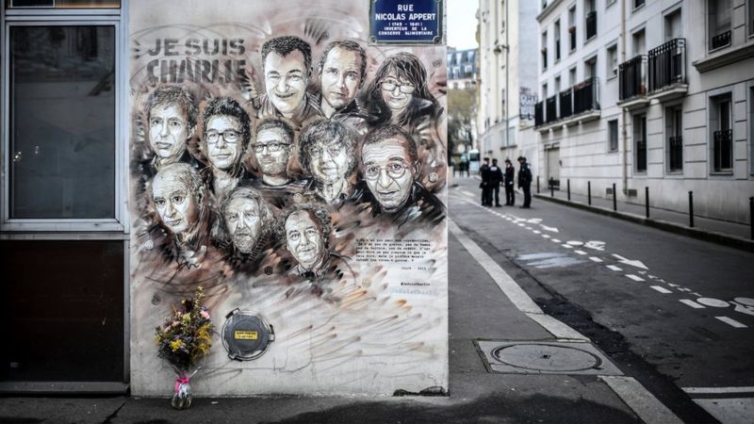Fourteen people are on trial in France over the deadly attack on the satirical magazine Charlie Hebdo more than five years ago.
Most of the alleged accomplices are in court in Paris, but three are being tried in absentia.
Charlie Hebdo: Fourteen suspects to face trial over Paris massacre https://t.co/6d661wJOmj
— BBC News (World) (@BBCWorld) September 2, 2020
They are accused of helping the militant Islamist attackers who shot dead 12 people in and around Charlie Hebdo's Paris office in January 2015.
A third gunman shot dead a policewoman and attacked a Jewish supermarket.In total, 17 people were killed in a period of just three days. The killings marked the beginning of a wave of jihadist attacks across France that left more than 250 people dead.
In the days following the attacks, millions of people took part in solidarity marches across France and around the world under the slogan "Je suis Charlie" (I am Charlie).
The magazine has marked the start of the trial by reprinting controversial cartoons of the Prophet Muhammad that sparked protests in several Muslim countries.
President Emmanuel Macron defended the freedom of the press and the French "freedom to blaspheme, which is linked to freedom of conscience".
What's expected at the trial?
Fourteen people stand accused of helping to prepare and plan the killings. Their trial will start on Wednesday after a delay of almost four months because of the coronavirus pandemic.
In March, the presiding judge said France's lockdown measures had made it impossible to bring together "all the parties, witnesses and experts under the necessary sanitary conditions".
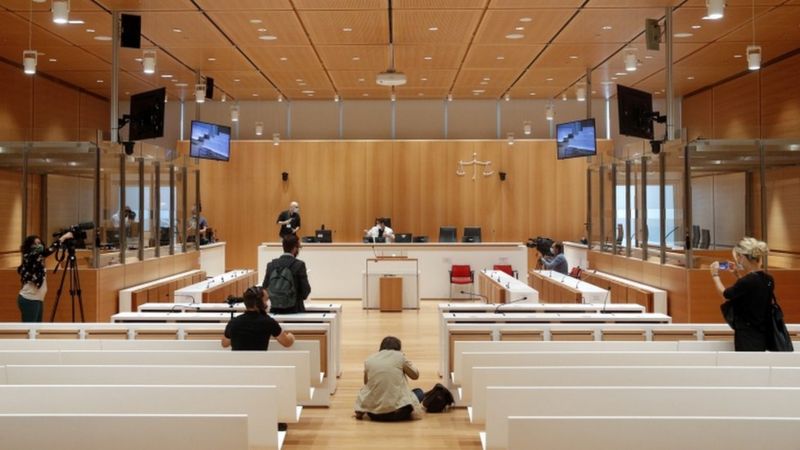
The alleged accomplices are accused of obtaining weapons and providing logistical support for the attack on Charlie Hebdo's office on 7 January 2015, as well as the subsequent attacks on a police officer and the Hyper Cacher supermarket.
But three suspects are believed to have disappeared in northern Syria and Iraq and will be tried in absentia.
Some reports suggest the three were killed in bombing campaigns against the Islamic State group (IS), but this has not been confirmed.
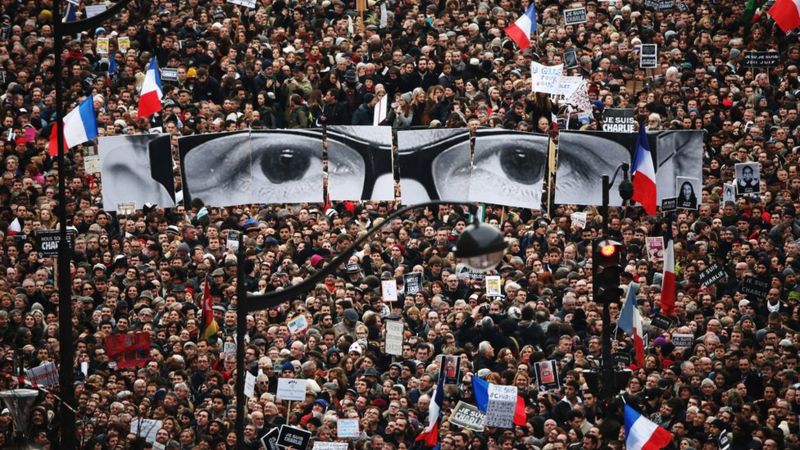
There are about 200 plaintiffs in the trial and survivors of the attacks are expected to testify, France's RFI broadcaster reports.
On Monday, anti-terror prosecutor Jean-François Ricard dismissed the suggestion that it was just "little helpers" who were facing justice.
"It is about individuals who are involved in the logistics, the preparation of the events, who provided means of financing, operational material, weapons [and] a residence," he told France Info radio.
"All this is essential to the terrorist action."The trial is expected to last until November.
What happened in 2015?
On 7 January that year, two French Muslim gunmen - brothers Chérif and Saïd Kouachi - stormed the Paris offices of Charlie Hebdo in the Rue Nicolas-Appert before opening fire on its staff.
The magazine's editor at the time, Stéphane Charbonnier, better known as Charb, was among four celebrated cartoonists who were killed.
The gunmen were eventually killed by security forces after a lengthy manhunt. Their victims were eight journalists, two police officers, a caretaker and a visitor.
In a related attack just days later, jihadist gunman Amedy Coulibaly killed three customers and an employee in a hostage siege at the Hyper Cacher Jewish supermarket in Porte de Vincennes in the east of Paris.
He had earlier shot dead a policewoman in the city.Security forces eventually stormed the supermarket before killing him and freeing the remaining hostages.
Who are the accused?
They include 35-year-old Ali Reza Polat, who is seen as the main link between the two attacks and is believed to have had a key role in obtaining the weapons used.
He subsequently attempted to flee to Dubai, Lebanon and Syria but without success. Mickaël Pastor Alwatik's DNA was found on two guns discovered at Coulibaly's home and a glove at the scene.
Mohamed Fares has told investigators he was a middleman involved in the sale of the assault rifle used in the supermarket attack, while Amir Ramdani, Samir Makhlouf, Willy Prevost and Christophe Raumel are accused of having provided support.
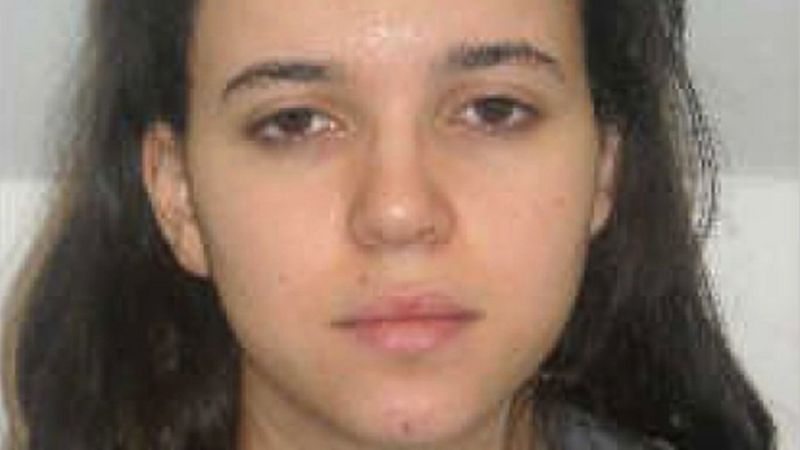
Two people in Belgium - garage owner Metin Karasucar and his associate Michel Catino, an unemployed Italian in his 60s and two more in north-eastern France garage owner Miguel Martinez and his associate Abdelaziz Abbad are accused of having worked to supply "assault rifles, automatic pistols, rocket launchers, chargers and ammunition, bulletproof vests" to the three gunmen.
On trial in absentia is Hayat Boumeddiene, Coulibaly's partner. She fled France for Syria a week before the attack.
Some reports suggested she had been killed in a US air strike last year but she was then reportedly seen in the al-Hol camp for IS detainees before subsequently escaping.
Mohamed and Mehdi Belhoucine are accused of helping Hayat Boumeddiene get to Syria. Both are believed to have been killed in Syria or Iraq. Mohamed Belhoucine also provided email addresses used by the other defendants.
Why was Charlie Hebdo targeted?
The radical weekly magazine was well known for taking swipes at the French establishment and religion and has long drawn controversy.
Cartoons of the Prophet Muhammad brought Charb death threats as well as 24-hour police protection prior to his death.
There was also a petrol bomb attack on the magazine's offices in 2011.The publication has also been seen as a beacon for free speech, with many of its defenders using the hashtag #JeSuisCharlie to defend it.
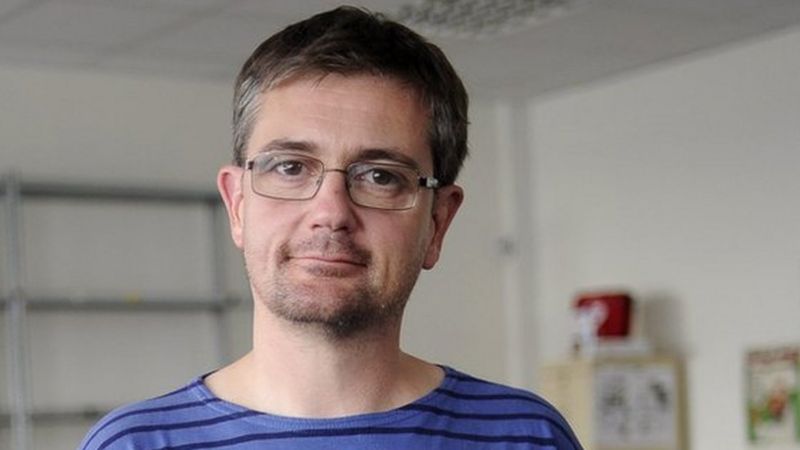
Charb strongly defended the Prophet Muhammad cartoons as symbolic of freedom of speech. "I don't blame Muslims for not laughing at our drawings," he told the Associated Press in 2012.
"I live under French law. I don't live under Koranic law."And on Tuesday, the magazine republished the cartoons that made them a target in 2015.
"We have always refused to do so, not because it is prohibited... but because there was a need for a good reason to do it," an editorial said.It added: "To reproduce these cartoons in the week the trial begins over the January 2015 terrorist attacks seemed essential to us."
Latest Stories
-
Kevin Taylor’s court appearance without arrest proof of judicial abuse under NDC – NPP MP
1 minute -
The inconvenient truth: Why Africa’s boardrooms must reset the boardroom governance clock
42 minutes -
Abuakwa South MP issues appeal for 21st-century overhaul of education system
55 minutes -
PURC reports consumer grievances and monitoring efforts in Northern Region
1 hour -
Barcelona B extend Abdul Aziz Issah’s loan for 2025/2026 Season
2 hours -
Black Sabbath singer Ozzy Osbourne dies at 76, Sky News reports
2 hours -
Forestry Commission responds to Sokoban wood sellers’ harassment claims
2 hours -
Government urges legal counsels to accelerate resolution of Chieftaincy disputes
2 hours -
Education: GQAA calls for an end to punishing students for using AI
2 hours -
Unlike NPP, the NDC gov’t is taking heed of my reports on galamsey though the menace continues – Erastus Asare Donkor
2 hours -
AT CEO urges students to embrace AI at TEDxUCC Career and Skill Summit
2 hours -
Anlo Youth Council welcomes Blekusu Sea Defence Phase II but warns of looming danger on unprotected coastal stretch
2 hours -
School under siege – Why cybersecurity must be a top priority in Ghanaian classrooms
2 hours -
Police arrest Nigerian suspect in armed robbery attack at Avenor
2 hours -
Volta NDC Chair: Mahama’s fast-track projects signal real change for the region
2 hours

